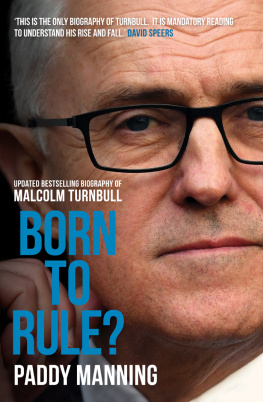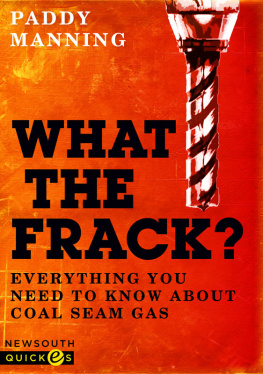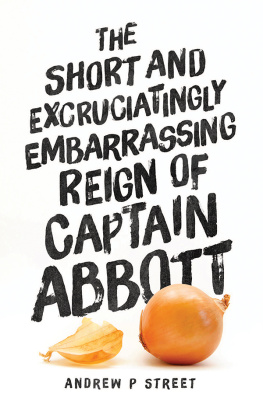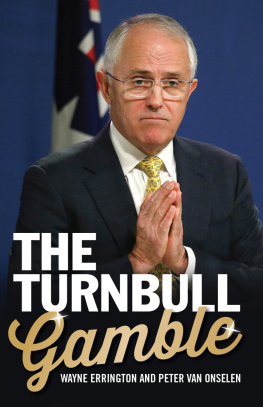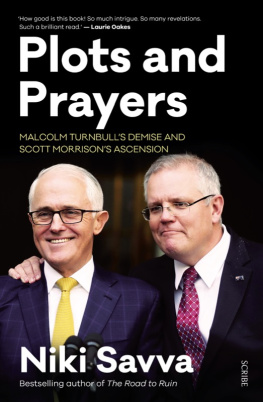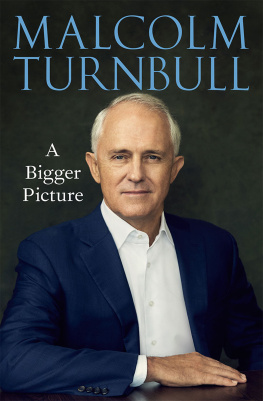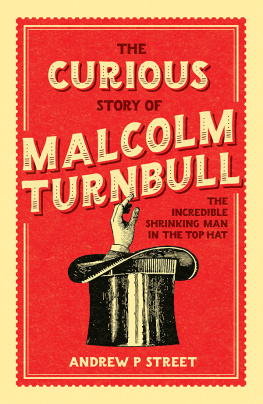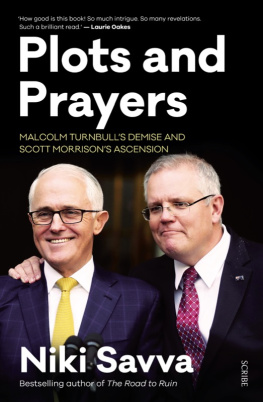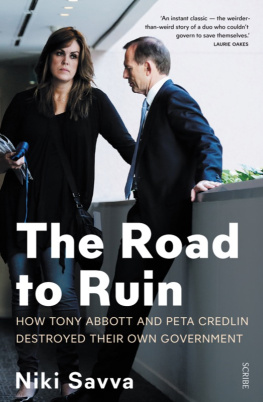Barrister, businessman, prime minister. In this updated biography, Paddy Manning captures why Malcolm Turnbull was no carbon-copy politician and why this ultimately cost him the top job.
David Speers, political editor, Sky News Australia
Malcolm unmasked. Essential reading for an understanding of a dark moment in the history of the Liberal Party.
Michael Yabsley, federal treasurer of the Liberal Party, 200810
There were always going to be more chapters in the life of Malcolm Turnbull. And Manning captures them beautifully. If Turnbull has squeezed a lot into one life, Manning seems to have squeezed even more into this captivating portrait of one of Australias most brilliant, audacious yet somehow inevitably contentious public figures.
Steve Vizard
PRAISE FOR BORN TO RULE 1st edition
Paddy Manning traipses through Malcolm Turnbulls life without sparing the downs, the political failures, the personal difficulties a rollicking tale that puts flesh on the bones of what we know about [Malcolm Turnbull].
Tory Shepherd, The Advertiser, Adelaide
Malcolm Turnbull boasts that he is a businessman turned politician.But there is too little focus on his business past. Paddy Mannings book Born to Rule is compulsory reading for anyone who wants to truly understand our new prime minister.
Colleen Ryan, three times Walkley Award winner
Paddy Manning has written a tough, astute and balanced account of Australias prime ministerwhere he came from, what experiences have shaped him.It is going to be indispensable for Australians making sense of our politics until the next federal election at least.
Bob Carr
We all know about this larger-than-life figure who has dominated journalism, corporate law, merchant banking and now politics This book is a lively page-turner, full of interesting tidbits. I learnt a lot, and Ive even changed my mind about the bloke.
Tom Switzer, Between the Lines, ABC Radio National
Forensic detail
Louis Nowra, The Australian
UPDATED BESTSELLING BIOGRAPHY
OF MALCOLM TURNBULL
BORN
TO
RULE?
PADDY MANNING

MELBOURNE UNIVERSITY PRESS
An imprint of Melbourne University Publishing Limited
Level 1, 715 Swanston Street, Carlton, Victoria 3053, Australia
www.mup.com.au
First published 2015
Updated paperback published 2018
Text Paddy Manning, 2015, 2018
Design and typography Melbourne University Publishing Limited, 2015, 2018
This book is copyright. Apart from any use permitted under the Copyright Act 1968 and subsequent amendments, no part may be reproduced, stored in a retrieval system or transmitted by any means or process whatsoever without the prior written permission of the publishers.
Every attempt has been made to locate the copyright holders for material quoted in this book. Any person or organisation that may have been overlooked or misattributed may contact the publisher.
Cover design by Philip Campbell Design
Front cover image by AAP image
Back cover image by Alex Ellinghausen/Fairfax Syndication
Typeset in Bembo 12/15pt by Cannon Typesetting
Printed in Australia by McPhersons Printing Group

9780522870787 (paperback)
9780522870794 (ebook)
For my father, Peter Manning, whose courageous and
independent journalism has been a lifelong inspiration.
Contents
Prologue
I t was like looking at a corpse. All eyes were on the prime minister, who sat at the long parliamentary table, the chamber near-silent, colour drained from his face. Malcolm Turnbull knew his fate. Metres away, deputy opposition leader Tanya Plibersek had a look of horror on her face as she watched him go through the motions for what everybody knew would be the last time. It was Thursday morning, 23 August 2018, and the grim division upon them was unprecedented: a motion to adjourn the House of Representativeseffectively, shutting down Australias democracy. The numbers were close. If the motion failed, the government could fall that day. With questions swirling about the eligibility of challenger Peter Dutton to even sit in parliament, let alone run the country, Australia was verging on a constitutional crisis unlike anything seen since the dismissal of 1975.
As the MPs shuffled in, taking their seats on either side of the chamber, Turnbull could hardly bring himself to look at the Coalition bench behind him, swelling with his most bitter political enemies. As much as possible, Turnbull kept his back turned, gazing across at his Labor opponents. Only Turnbull knew his thoughts, but surely he must have wondered, in these final moments, whether he might have been happier on the other side? Turnbull and the Liberals were never a great fit, and Labor had courted him once twenty years ago. Right now, the PM was staring into the abyss. In the lowest of voices, opposition leader Bill Shorten spoke gentlyinaudible, expertlyabout how poorly Turnbull was being treated by his party, and didnt deserve what was coming. His words must have given some comfort because Turnbulls face warmed briefly into a thin smile.
At 11.33 am, manager of government business Christopher Pyne moved: That the House do now adjourn. His opposition counterpart, Tony Burke, rose to his feet:
This is extraordinary. What is happening right now is that the government have decided that this place has fallen apart so completely that they are dissolving the parliament for the day entirely. There will be no question time today because they dont know who their ministers are. There will be no question time today because they dont know who their Prime Minister is. There will be no question time today because those opposite have stopped governing No government in living memory has dissembled so much that they decided the parliament couldnt meet.
No mistake, this was much more than an internal Liberal Party squabble. It was a bona fide far-right coup, spurred on by Turnbulls nemesis Tony Abbottthe exprime minister he had put to the sword three years earlierhell-bent on revenge. Home affairs minister Peter Dutton, the former Queensland cop with strongman instincts, was the unlikely front-stabberan unpopular figure with extreme policy positionsbut it was Abbott sharpening the knives. Some fights are simply too important to lose, hed declared weeks earlier, to scoffs here and there, but Abbott was now on the brink of a famous victory. His rally-cry was for Australia to pull out of the Paris Agreement on climate changeeven though, as prime minister, he had signed the country up to it. There would be grave international consequences, but the world had changed since 2015: the UK had voted for Brexit; the US had voted in Donald Trump. Knocking off Turnbull was Australias moment: would the nation take a leap into the unknown, following the populist right overseas?
Turnbull and Abbott had duelled throughout their careers, living parallel lives. Both Rhodes scholars, both former journalists, the two politicians had fought for the heart and soul of the Liberals since the demise of John Howard, the last leader who could unite the partys warring moderate and conservative factions. The numbers had always been excruciatingly close between the twoAbbott had won by a single vote in 2009; five votes swung it for Turnbull in 2015. The Liberal Party was split fair down the middle.
Turnbull had been a high-risk choice for leader when he rolled Abbott. He had convinced his colleagues he was a changed man from the leader who flamed-out so spectacularly in opposition a decade earlier. It was true: Turnbull
Next page
